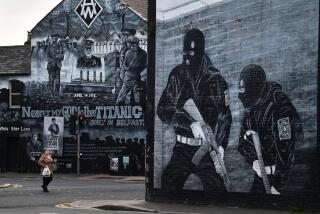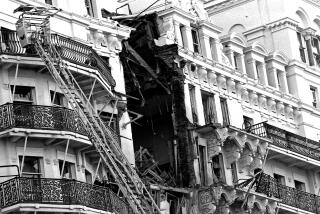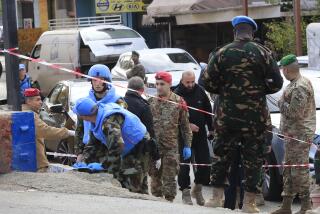British Soldier’s Death Comes After Accelerating Attacks
- Share via
LONDON — Such is the chronicle of a death foretold in Northern Ireland: A terrorist sniper fired a high-powered rifle from ambush through a night scope, killing British infantryman Stephen Restorick with a single shot to the back that pierced his flak jacket.
Restorick, 23, fell mortally wounded Wednesday night as he was returning Lorraine McElroy’s driver’s license with a smile at a checkpoint in the rural village of Bessbrook about 30 miles southwest of Belfast, the provincial capital.
By Thursday, an embittered and outraged Northern Ireland seemed headed again toward sectarian combat.
McElroy, who was returning home with her husband after buying ice cream for their children, said Restorick “checked my license, handed it back to me and smiled and thanked me. And just straight away there was . . . a crack and a flash.”
McElroy was slightly injured from shrapnel in the attack at a permanent checkpoint. “You read in the papers about soldiers killed, but he was a man, and he died alone,” she said.
Bessbrook, a mostly Protestant village in the strongly pro-republican south, is British army headquarters in the most contentious rural area of Northern Ireland. It is home to the busiest helicopter landing port in Europe because snipers and land mines make it too dangerous to resupply police and military outposts by road.
The Irish Republican Army did not immediately claim responsibility for the killing, but the attack, in an area of southeastern Northern Ireland where the IRA once put up a sign saying “Caution, Sniper at Work,” bore the extremists’ trademark.
The trooper from the Royal Horse Artillery was the first 1997 fatality in an accelerating round of attacks against police and soldiers in Northern Ireland. Until Wednesday, there had been repeated near-misses. Failed bomb, rocket and grenade attacks have been echoed by warnings that a new death seemed inevitable and widespread fears that it would provoke retaliation from Protestant extremists still nominally observing a 1994 cease-fire.
“There is no way that Stephen’s death should lead to the start of new killings. Hotheads on the other side must not react,” said Rita Restorick, the dead soldier’s mother.
Similar appeals to restive Protestant gunmen came Thursday from civic and church leaders and government officials. For weeks, senior paramilitary leaders have been telling reporters in Belfast that they are controlling militants in their ranks only with great difficulty.
“Don’t lower yourself to the standards, the levels of the people who have done this,” urged Patrick Mayhew, the British government minister for Northern Ireland. He argued that it would be “evil” and self-defeating for Protestant paramilitaries to return to violence and said the attack demonstrated the “hypocrisy of those inextricably linked with the IRA who speak of peace.”
The shaky cease-fire by loyalists who seek continued British rule for the Protestant-majority province is the last vestige of a general truce that exploded after 17 months with an IRA bomb in London one year ago.
John Major and John Bruton, the prime ministers of Britain and Ireland who have been repeatedly frustrated in their attempts to forge peace in Northern Ireland after nearly three decades of sectarian violence, both condemned the slaying of the soldier.
Bruton called it “anti-Irish and contrary to the interests of all in Ireland.”
In Washington on Thursday, President Clinton said he was outraged and grieved by the “callous” slaying of the soldier. “All those who care about the future of Northern Ireland must join me in condemning this cowardly crime,” Clinton said in a written statement urging Northern Ireland’s people to “take the path of peace and reconciliation, not hatred and violence.”
Gerry Adams, president of Sinn Fein, which is the political arm of the IRA, lamented the killing as “a tragic event which reemphasizes the need for all of us to redouble our efforts to rebuild the peace process.”
Adams accuses the British of bad faith in constructing a peace process that has excluded Sinn Fein for want of a new IRA cease-fire.
Republicans, who seek union of the six counties of Northern Ireland with the 26-county Irish Republic, say the British government is trying to win a victory over the IRA at skewered peace talks that it failed to win on the battlefield. Parties representing the Protestant majority believe the IRA’s renewed campaign of terror is calculated to provoke Protestant retaliation, followed by such violence and chaos that Britain would be forced to accept Sinn Fein at peace talks without conditions.
More to Read
Sign up for Essential California
The most important California stories and recommendations in your inbox every morning.
You may occasionally receive promotional content from the Los Angeles Times.













